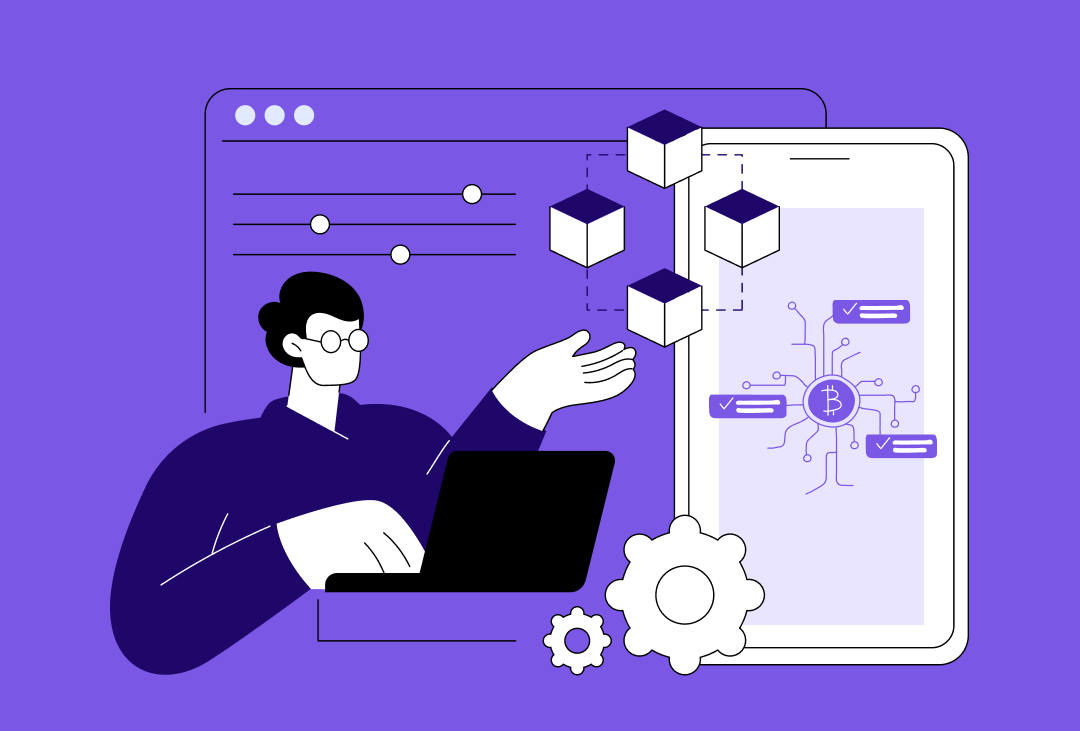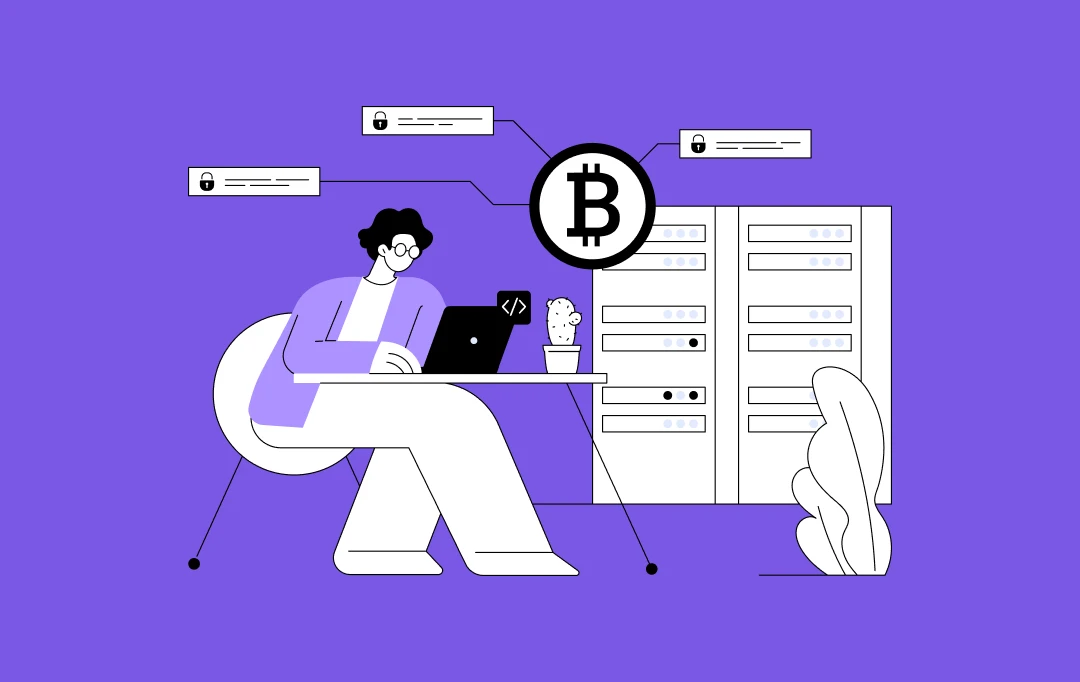- Why Adopting Blockchain in Supply Chain Management Is the Need of the Hour
- Data Silos
- Lack of Transparency
- Inefficient Tracking and Traceability
- Counterfeiting and Fraud
- High Costs
- Inefficient QA Process
- Inability to Meet User Demands
- Supply Chain Disruptions
- What is Blockchain in Supply Chains and How Does It Work?
- How Does Blockchain Technology Impact Supply Chain Performance: Applications & Advantages
- Real-Time Tracking and Transparency
- Healthy Customer Relationships
- Strengthened Traceability
- Enhanced Security
- Reduced Costs and Higher ROI
- Faster Processing
- Effective Tradeability
- Better Quality Control and Compliance
- Real-World Examples of Businesses Employing Blockchain in Supply Chain
- Walmart
- Bumble Bee Seafoods
- Brilliant Earth
- Blockchain & New-Age Technologies’ Convergence Making Supply Chain Management Effective
- 1. Artificial Intelligence (AI)
- 2. Internet of Things (IoT)
- 3. Beacon Technology
- Implement Blockchain in Supply Chain with Appinventiv
- FAQs
In the vast and intricate web of global commerce, efficiency and transparency are the golden standards for successful supply chain management (SCM). Yet, traditional systems often find themselves entangled in a myriad of challenges: from opaque processes to inefficient intermediaries, the journey of a product from manufacturer to consumer is fraught with several complexities. For instance, lack of transparency and traceability is an industry-wide challenge, causing errors, delays, and increased costs.
This is where blockchain, the digital record-keeping technology, emerges as a transformative solution, providing end-to-end visibility to track and trace the entire production process with enhanced automation efficiency. For instance, blockchain in the food supply chain is rapidly addressing all the issues for ease of process and reducing the cost of the farming processes.

Blockchain in supply chain management can greatly benefit businesses by enabling transparent, cost-effective, and faster product delivery, improving coordination between partners and enhancing products’ traceability. From optimizing inventory management to streamlining transactions and beyond, blockchain promises unprecedented efficiency, security, and sustainability.
This blog will help you understand the transformative impact of blockchain on supply chain management, detailing its applications and advantages in enhancing transparency, efficiency, security, and traceability across the industry.
Why Adopting Blockchain in Supply Chain Management Is the Need of the Hour
Due to the ever-increasing security threats and evolving consumer needs, traditional supply chains face several challenges that impede efficiency, transparency, and responsiveness. These challenges underscore the urgent necessity for adopting blockchain technology as a transformative solution capable of revolutionizing the way we conceive, operate, and secure supply chain management processes. Let’s talk about a few of the most complex challenges of traditional SCM:

Data Silos
Traditional supply chains typically rely on paper-based manual systems and store information in isolated databases. It results in data silos that hinder communication and collaboration between stakeholders, which benefits the exploiters.
Lack of Transparency
Another challenge found in traditional supply chain management is the lack of visibility or transparency across various stages of production, transportation, and distribution. It leads to inefficiencies and increased risk of errors or fraud.
Inefficient Tracking and Traceability
Tracking the movement of goods through multiple intermediaries can be challenging in traditional supply chains, leading to delays, inaccuracies, and difficulties in tracing products in case of recalls or quality issues.
Counterfeiting and Fraud
The lack of transparency and traceability makes traditional supply chains vulnerable to counterfeiting, theft, and other fraudulent activities, compromising product integrity and brand reputation. The exploiters can easily replace the original product with ‘lookalike’ counterfeit ones.
High Costs
Since every team creates and maintains an individual database, they often invest their efforts and capital into gathering the same information repeatedly. This brings a drastic rise in the associated cost, eating into profit margins and hindering competitiveness.
Inefficient QA Process
The quality analysis (QA) process is prolonged due to disruptions in the traditional SCM procedure, making it both time-consuming and costly to determine the exact moment when quality is compromised or the product is replaced. Furthermore, the centralized structure of company operations exposes them to various risks, including violations of codes of conduct and fraudulent activities, highlighting the dire need for an efficient risk management process in supply chain systems.
Inability to Meet User Demands
Entrepreneurs find it challenging to stay updated with evolving user demands and bring required changes into their working strategies. Also, as modern SCM systems continue to expand, they are becoming increasingly complex, requiring innovative solutions and smart strategies for efficient management.
Supply Chain Disruptions
Last but not least, external factors such as natural disasters, geopolitical conflicts, or global pandemics can disrupt traditional supply chains, leading to delays, shortages, and increased costs.
Addressing these challenges requires innovative solutions and emerging technologies such as blockchain to enhance transparency, traceability, and efficiency throughout the supply chain ecosystem. Blockchain for supply chains has the potential to revolutionize almost every industry — be it Real Estate, Healthcare, Fintech, Fashion, Insurance, or Travel.

What is Blockchain in Supply Chains and How Does It Work?
Blockchain for supply chains is an innovative solution to address several challenges. It helps track and manage the flow of goods, information, and finances across the various stages of the supply chain process. Blockchain enables the creation of a distributed ledger that can be shared among multiple parties, including suppliers, manufacturers, distributors, retailers, and consumers.
In a typical supply chain, different processes are involved, including procurement of raw materials, manufacturing, financing, etc. These processes can take place in one or more transactions. Blockchain in supply chain management records these transactions on different “blocks.” These blocks are then linked together in a chronological and immutable “chain,” creating a transparent and auditable record of the entire supply chain process, making each stakeholder an active participant in all the transactions.
By leveraging blockchain in logistics and supply chain, the participants can create a transparent and tamper-proof record of transactions and product movement.
Related Article: Blockchain Technology: All Set To Revamp the Future of Transactions

How Does Blockchain Technology Impact Supply Chain Performance: Applications & Advantages
Blockchain technology offers several key benefits for supply chain management, including enhanced transparency, traceability, efficiency, and security. It allows participants to track the movement of goods in real time, verify the authenticity and provenance of products, streamline processes such as payments and documentation, and reduce the risk of fraud, counterfeiting, and errors. Let’s discover in detail the myriad benefits of blockchain in supply chain management:

Real-Time Tracking and Transparency
Blockchain provides a transparent and immutable ledger of transactions, allowing all participants in the supply chain to track real-time information about goods, transactions, and events. This transparency helps to improve trust and accountability among stakeholders.
Healthy Customer Relationships
By making the process of order tracking transparent, blockchain and supply chain play a huge role in elevating customer experience. Consumers can learn everything about the products they are using and can check the authenticity of their products. This entails a sense of trust among the consumers and the respective brands.
Strengthened Traceability
With blockchain, each product can be assigned a unique digital identifier that is recorded on the blockchain at each stage of the supply chain. This allows for complete traceability, enabling stakeholders to track the provenance of products from their origin to their final destination. It helps identify and address issues such as product recalls, counterfeit goods, and supply chain disruptions more efficiently.
Enhanced Security
Blockchain uses cryptographic techniques to secure transactions and data, making it virtually impossible to tamper with or alter records without detection. This enhances the security and data privacy of the supply chain, reducing the risk of fraud, counterfeiting, and cyberattacks.
Reduced Costs and Higher ROI
By improving efficiency, transparency, and security, blockchain can help reduce costs associated with manual processes, errors, fraud, and supply chain disruptions. It also enables more accurate inventory management, optimizing resource allocation and reducing waste. In short, blockchain helps businesses create a better brand image in the decentralized market and enjoy higher ROI.
Faster Processing
Blockchain for supply chains facilitates faster processing of transactions and data sharing by replacing third-party intermediaries and eliminating the dependency on pen and paper with Smart Contracts. With transactions recorded on a decentralized ledger and validated through consensus mechanisms, information can be exchanged and updated in real time, leading to quicker decision-making, shorter lead times, and accelerated supply chain processes.
Effective Tradeability
Blockchain in supply chains enables efficient licensing and ownership. With the help of smart contracts, blockchain can accurately license services, software, and products. Additionally, blockchain offers consensus – which means there is no dispute in chains related to the transactions by design. All the entities on the blockchain have the same ledger version added, which has the potential to track the ownership records.
Better Quality Control and Compliance
Blockchain enables real-time monitoring and verification of compliance with industry standards, regulatory requirements, and quality control measures throughout the supply chain ecosystem. This helps companies ensure compliance, mitigate risks and maintain high quality and safety standards.
Also Read: How can blockchain be used to strengthen the medical supply chain?

Real-World Examples of Businesses Employing Blockchain in Supply Chain
Many reputed brands already leverage the benefits of blockchain technology in supply chain management. Given below are a few popular examples of blockchain in supply chains:
Walmart
Walmart, the retail giant, has integrated blockchain technology into its food supply chain to add transparency to the decentralized food supply ecosystem. By placing the supply chain on blockchain, the company can track the provenance and condition of its pork items coming from China. The company is also able to keep a check on practices like whether a farm has sold an infected batch to a specific location.
Bumble Bee Seafoods
With an objective to provide consumers with a better insight into their food origins, Bumble Bee Seafoods leverages blockchain supply chain use cases to trace tuna’s journey from the ocean to the local retailers. Consumers can access the origin as well as the history of Bumble Bee Seafood’s tuna by using their smartphones and scanning the QR codes given on the bags of tuna steaks.
Brilliant Earth
Brilliant Earth is a retailer of ethically sourced diamonds. The brand has implemented blockchain technology in supply chains to more securely track the origins of its diamonds and give assurance to customers for its responsible actions. With a blockchain-enabled database, the brand can track the entire supply chain. The technology also allows all the supporting documentation, such as invoices and certifications, across the supply chain in a more secure way.
As brands continue to implement blockchain technology in supply chain management, it is imperative for businesses to stay updated with the top blockchain technology trends and a set of technologies that will unfold better outcomes in the near future.
Blockchain & New-Age Technologies’ Convergence Making Supply Chain Management Effective
As industries embrace digital transformation, the convergence of new age technologies and blockchain in logistics and supply chain revolutionizes the entire SCM practices. Let’s talk about this convergence in detail:
1. Artificial Intelligence (AI)
The convergence of Blockchain and AI helps manage data in a simplified and effective manner. By leveraging AI algorithms with blockchain’s decentralized ledger, organizations gain unprecedented insights into supply chain operations, enabling proactive risk management and optimization of processes. It also adds more security to the ecosystem using the power of predictive analytics and improves scalability.
2. Internet of Things (IoT)
Combining IoT with Blockchain, also termed as Blockchain of Things, enables real-time tracking and monitoring of assets throughout the supply chain journey. IoT sensors collect and transmit data to the blockchain, providing stakeholders with instant visibility into the status, location, and condition of goods. The dual technologies will make it easier to keep a real-time track of every activity across the chain and inform the connected devices for troubleshooting purposes.
3. Beacon Technology
Beacon is another technology that will boost the use of blockchain in supply chain management. It will enable businesses to guide all of their coworkers and users about their product and its real-time status, bringing a sense of trust in the whole process.
Implement Blockchain in Supply Chain with Appinventiv
In the dynamic realm of supply chain management, the disruptive influence of blockchain technology is undeniable. As businesses embark on their blockchain journey, they should consider partnering with a reputed blockchain development company that can make the blockchain adoption process a lot easier, smoother, and more profitable.
This is where Appinventiv shines as your trusted tech partner, providing award-winning blockchain development services to redefine supply chain operations across industries worldwide. Our team of 1500+ tech professionals carries the core competency in building groundbreaking solutions like Nova and Empire, helping you enjoy the maximum benefits of blockchain in the supply chain ecosystem.
Appinventiv’s holistic approach to blockchain integration extends far beyond mere implementation. It encompasses comprehensive consulting, meticulous planning, and seamless execution to ensure that blockchain solutions are seamlessly integrated into existing supply chain frameworks, maximizing efficiency, transparency, and trust.
We ensure a seamless delivery of blockchain and supply chain management services tailored to meet your unique needs and objectives. Partner with us to leverage the power of blockchain for supply chains, unlock new opportunities, drive efficiencies, and stay ahead in an increasingly competitive global marketplace.
FAQs
Q. What is supply chain management, and why is it Important?
A. Supply chain management is a cross-functional approach that involves managing everything right from the flow of raw materials to internal processing and delivery of the final product at the customers’ end. It holds huge importance in the market because it reduces operating time and cost, enhances financial standards, boosts customer services, and more.
Know how we built an efficient SCM software for a leading manufacturing enterprise, leading to 60% increase in its supply chain visibility.
Q. How much does it cost to implement blockchain in the supply chain?
A. The cost of implementing blockchain in supply chain management can vary significantly depending on various factors such as the complexity of the blockchain and supply chain network, the scale of implementation, the chosen blockchain platform, the location of blockchain developers, and so on.
On average, the cost of implementing blockchain for a small-scale supply chain can range between $30,000 and $100,000, while larger and more complex projects could require substantial investments of $100,000 to $300,000 or more.
Therefore, it is essential to conduct a thorough analysis of your specific requirements and discuss your project idea with blockchain experts to determine the precise cost of implementing blockchain in supply chain management.
Q. How can blockchain benefit the supply chain?
A. Blockchain for the supply chain can benefit the business in various ways. Some of the most remarkable benefits of blockchain for supply chains are:
- Enhanced Transparency: Blockchain ensures real-time access to transaction data for all participants, fostering trust and accountability.
- Increased Efficiency: Blockchain helps optimize supply chain operations by automating manual processes and executing smart contracts.
- Improved Traceability: Every product is assigned a unique digital identifier, enabling complete tracking of its journey through the supply chain.
- Enhanced Security: Blockchain’s cryptographic techniques help secure transactions, preventing tampering and ensuring data integrity.
- Reduced Costs: Blockchain in supply chains can help reduce costs by enabling more accurate inventory management, optimizing resource allocation, and reducing waste.
- Better Compliance and Quality Control: Real-time monitoring ensures adherence to regulations and standards, enhancing product quality and safety.
Q. How does blockchain work in the supply chain?
A. Blockchain technology in supply chain management works by creating a decentralized, immutable ledger of transactions that are shared among multiple parties in a network. Each transaction, such as the movement of goods or the transfer of ownership, is recorded as a block on the blockchain. These blocks are linked together in a chronological and transparent chain, providing a complete and tamper-proof record of every interaction throughout the supply chain.
By leveraging blockchain in logistics and supply chain, stakeholders can gain real-time visibility, transparency, and traceability of products, enabling enhanced efficiency, security, and trust across the SCM ecosystem.


- In just 2 mins you will get a response
- Your idea is 100% protected by our Non Disclosure Agreement.

How Much Does It Cost to Develop a Crypto Wallet App Like Metamask?
Key takeaways: Developing a MetaMask-like crypto wallet can cost anywhere from $30,000 to $250,000+, depending on the complexity of features and integration. The cost breakdown includes development, security, integration with blockchain networks, and ongoing maintenance. A customized wallet opens up new revenue opportunities, brand differentiation, and long-term business growth. Since its launch in 2016, MetaMask…

How Much Does it Cost to Build a Blockchain App in the UAE?
Key takeaways: The UAE blockchain market is rapidly expanding, with the BFSI sector capturing over 50% of the market share. As blockchain adoption accelerates, development costs in the UAE range from AED 55,000 to AED 1.85 million, depending on app complexity and features. Factors such as platform selection, security measures, and third-party integrations directly impact…

How Blockchain Integration Is Optimizing Business Processes in Dubai
Key takeaways: Blockchain is a strategic enabler in Dubai, transforming traditional business workflows by enhancing efficiency, transparency, and automation beyond cryptocurrency applications. Dubai’s supportive regulatory environment and government initiatives (e.g., VARA, Dubai Blockchain Strategy) create a clear, innovation-friendly framework, accelerating blockchain adoption. Integration with legacy systems through modular blockchain solutions enables enterprises to modernize operations…

















